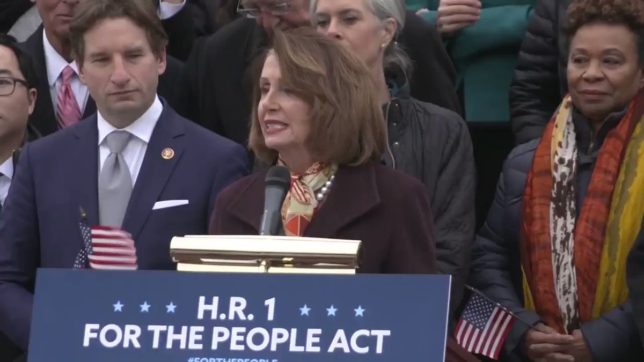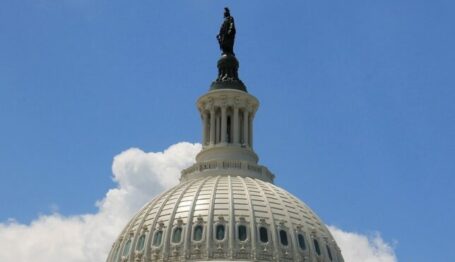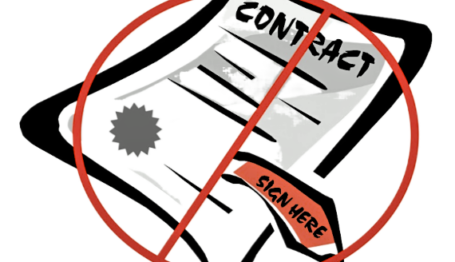Philanthropy
For the People Act (H.R. 1): Congress Recycling Bad Ideas from 2019
 Speaker of the House Nancy Pelosi (D-CA) speaks at a press event before passage of H.R. 1 in 2019.
Speaker of the House Nancy Pelosi (D-CA) speaks at a press event before passage of H.R. 1 in 2019.

In the past week, two groups sent letters to Democratic and Republic congressional leaders condemning the ridiculously named For the People Act (H.R. 1 and S. 1) as a direct assault on fundamental freedoms protected by the First Amendment.
H.R. 1 is a resuscitated version of the previous Congress’s H.R. 1, which the Democratic-controlled House of Representatives passed on a strictly party line vote and the Republican-controlled Senate duly ignored.
S. 1, the related bill in the Senate, has not been introduced yet this session. For more on H.R. 1 and S. 1, see the resource guide provided by the Institute for Free Speech.
Updated February 10, 2021: Public Interest Legal Foundation has compiled “H.R. 1 (2021) Studies and Reference Materials.”
The two letters are reproduced below.
Coalition to Oppose H.R. 1 and S. 1
February 1, 2021
Dear Speaker Pelosi, Republican Leader McCarthy, Majority Leader Schumer, and Republican Leader McConnell,
On behalf of the millions of Americans who cherish and rely on the right to support causes we believe in without fear of harassment and intimidation, we, the undersigned individuals and organizations, ask you to reject H.R. 1 and S. 1, the deceptively named “For the People Act.”
Nonprofit organizations serve a vital role in encouraging free speech and the free exchange of ideas. Privately supporting causes — and the organizations advancing those causes — is a fundamental freedom protected by the First Amendment.
Our Founding Fathers used pen names to encourage independence from Great Britain. Nearly 200 years later, the Supreme Court of the United States blocked the state of Alabama from demanding the supporter list of the NAACP, citing concerns about retribution against the group’s members and financial backers. And last month, the Supreme Court agreed to hear a case challenging a California regulation forcing charities to hand over their supporter lists to the government.
H.R. 1 and S. 1 would dramatically alter the First Amendment protections that Americans have enjoyed since the founding of our country. It would institute sweeping new burdens on their constitutionally protected rights to freely speak, publish, and organize into groups to advocate for the causes they support. In particular, H.R. 1 and S. 1 would impose onerous and unworkable regulatory standards on the ability of individual Americans and groups of Americans to discuss the policy issues of the day with elected officials and the public. This bill would also violate the privacy of advocacy groups and their supporters and stringently and excessively regulate political speech on the Internet.
More specifically, H.R. 1 and S. 1 include numerous, sweeping provisions that would violate the First Amendment rights of Americans by:
- Subjecting citizens who contribute to nonprofit organizations to harassment and intimidation by making their personal information available in a searchable government database. This mandate focuses public attention on the individuals and donors who support causes instead of on the messages communicated by those organizations, exacerbating the politics of division and personal destruction and further coarsening political discourse. This would have a considerable chilling effect on civic engagement and free speech.
- Policing speech by Americans about legislative issues by expanding the definition of “electioneering communications” – historically limited to large-scale TV and radio campaigns targeted to the electorate in a campaign for office – to include online advertising that bears no relation to an election. This will subject far more issue ads to burdensome disclaimer requirements, which will coerce groups into truncating their message and make some advertising, especially online, practically impossible.
- Indiscriminately regulating groups that incidentally or occasionally advocate on federal judicial nominations and require those groups to broadly expose their donors, even if those citizens had nothing to do with the groups’ speech about judicial nominees.
- Forcing groups to publicly identify their supporters on the face of the ads themselves. Faced with the prospect of being inaccurately associated with what the law would consider (unjustifiably, in many or most instances) “campaign” ads in FEC reports and disclaimers, many donors will choose not to give to nonprofit groups.
- Increasing regulation of the online speech of American citizens while purporting (and failing) to address the threat of Russian propaganda.
- Expanding the universe of regulated online political speech by Americans beyond paid advertising to include communications on groups’ or individuals’ own websites and email messages.
- Deterring American citizens from serving their country through political appointments by forcing them to disclose their donations to causes they have supported in the past.
Our elections will not be more honest, more informed, or more secure from foreign interference if we sacrifice the privacy of American citizens. But our democracy will be weakened if voices are eliminated from public debate through intimidation and overregulation.
As a Member of Congress, you have taken an oath to support and defend the Constitution of the United States. H.R. 1 and S. 1 propose multiple violations of our First Amendment rights. On behalf of the millions of American citizens our organizations represent, we strongly urge you to oppose H.R. 1 and S. 1.
[Signed by over 130 organizations]
A PDF of the coalition letter is available here.
Philanthropy Roundtable Letter
January 27, 2021
Dear Members of Congress:
We write to you as organizations that care deeply about philanthropy to urge you to oppose the newly proposed “Initiative to Accelerate Charitable Giving.” Contrary to its title, this proposal would severely hamper Americans’ ability to give to causes they care about.
The core of the Initiative is a series of unnecessary and arbitrary regulations on donor-advised funds, which are an increasingly popular vehicle for charitable giving. Donor-advised funds allow individuals to donate as much as they can in a given year; they facilitate both immediate and long-term giving for a specific cause or local community. Beyond donor-advised funds, the Initiative also takes aim at a family’s ability to serve its own foundation, which would unfairly target smaller and less-wealthy institutions.
Throughout history, the freedom to give has been an indispensable part of America’s culture and social fabric. Charity helps us come together as a nation, overcome partisan divides, and face serious societal challenges, both now and in the future. The current COVID-19 pandemic is a case in point: Charitable giving was up 7.5 percent during the first half of 2020, and major donor-advised fund providers have seen both the value and number of charitable grants rise by about 50 percent.
It’s important to keep America’s charitable sector strong and vibrant by allowing people to easily give to the causes they care about. We call on you to oppose attempts to discourage donors or undermine important vehicles for charitable giving, particularly during times of crisis when philanthropic engagement is most needed.
Yours sincerely,
[Signed by the heads of 65 free-market and conservative organizations.]
[Scott Walter, president of the Capital Research Center, signed the letter in his personal capacity.]
A PDF of the Philanthropy Roundtable letter is available here.



